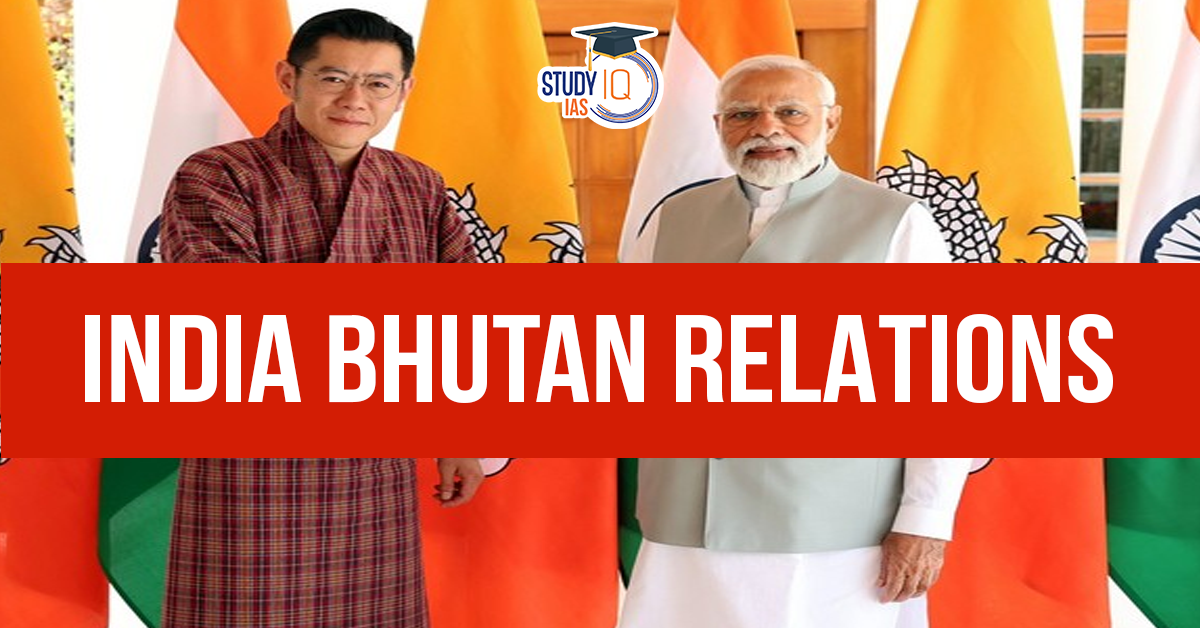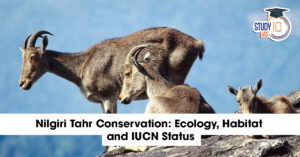Table of Contents
Bhutanese King Jigme Khesar Namgyel Wangchuck recently visited India.
India Bhutan Relations: An Overview
Evolution of Ties
India and Bhutan share a unique and special relationship that is based on a long history of cultural, economic, and political ties.
- Strategic Importance: Despite its small size, Bhutan occupies a strategically important position in South Asia and has been a key partner for India in regional cooperation efforts.
- Establishment of Diplomatic ties: Diplomatic relations between India and Bhutan were established in 1968 with the establishment of a special office of India in Thimphu.
- 1940 treaty of Friendship and cooperation: The basic framework of India-Bhutan bilateral relations is the Treaty of Friendship and Cooperation signed in 1949 between the two countries and revised in February 2007.
- The 1949 Treaty ensured peace and non-interference in each other’s internal affairs.
- The 2007 Treaty replaced the previous requirement for Bhutan to seek India’s advice on foreign policy and highlighted the importance of sovereignty and collaboration rooted in shared interests.
- The Golden Jubilee of the establishment of formal diplomatic relations between India and Bhutan was celebrated in the year 2018.
Areas of Cooperation and Significance
| Dimension | Details |
| Strategic |
|
| Economic |
|
| Cultural and Educational |
|
| Energy |
|
| Regional | Both nations cooperate in regional forums such as BIMSTEC and SAARC. |
| Environmental | India is supporting Bhutan in its efforts to become carbon negative. |
| Connectivity |
|
| Security |
|
Challenges In India-Bhutan Relations
- Chinese Influence: India backs Bhutan’s claim over Doklam as it is strategically important for India’s security.
- Dominance of the region by China could threaten the Siliguri Corridor, a narrow stretch that connects the Indian mainland with its north-eastern states.
- Issues in hydropower trade: India’s past changes in power purchasing policy, refusal to admit Bhutan into the National Power Grid, etc has created a rift in the relationship.
- Hideout for militants: Militant outfits like United Liberation Front of Assam (ULFA), National Democratic Front of Bodos (NDFB), etc use the dense forests of Southern Bhutan as their hideouts and operate against India.
- Operation All Clear (2003-04) was the first action against these militants by Bhutan.
- BBIN initiative: The Bangladesh-Bhutan-India-Nepal (BBIN) Motor Vehicle Agreement, proposed by India to improve connectivity in the region, is on hold by Bhutan due to environmental concerns.
- Access to trade: Bhutan is diversifying its market by reaching out to Bangladesh, with the two countries having signed a preferential trade agreement in 2021.
Way Forward
- Initiating Trilogue: Opening such communication channels can minimise uncertainties as questions of peace and conflict cannot be resolved by potential stand-offs (like Doklam) in the future.
- Diversifying economic engagements: For now, India’s economic relations with Bhutan continue to be dominated by hydropower projects.
- Strengthening collaboration in fields such as fintech, space tech, and biotech between the two countries can lead to a stronger partnership.
- Improving people-to-people ties: Soft power diplomacy can be induced through Buddhism and by encouraging more tourist exchanges between the two countries.
- Security measures: Establishment of contact points between countries and mechanisms for real-time sharing of information in criminal matters,
- Capacity building and skill development of law enforcement personnel manning border check-posts,
- Development of a Standard Operating Procedure (SOP) on repatriation for the Indo-Bhutan border.


 Graphic Processing Units (GPUs) – Work...
Graphic Processing Units (GPUs) – Work...
 Gold Imports and the Indian Economy – ...
Gold Imports and the Indian Economy – ...
 Nilgiri Tahr Conservation: Ecology, Habi...
Nilgiri Tahr Conservation: Ecology, Habi...




















